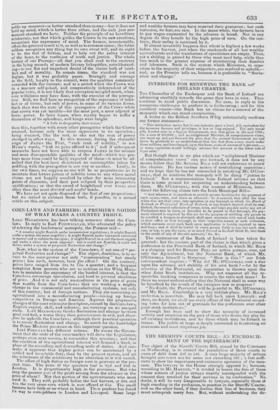CORN-LAWS AND FARMERS: A PREMIERS NOTION OF WHAT MAKES A
COUNTRY THRIVE.
Loan MELBOURNE has been talking nonsense about the Corn- laws. In reply to Earl FITEWILLIAM, who advocated the policy of relaxing the landowners monopoly, the Premier said- " A country might flourish under inconvenient regulations ; it might flourish under a system the most impolitic ; it might flourish under laws most calculated to repress and to subdue its energies; it might flourish in a soil the most rugged, and under a clinic the most ungenial but it could not flourish, it could not thrive, under a system of perpetual fluctuation and change."
Now, what is the system of the Corn-laws, if not one of " per- petual fluctuation and change?" The object, doubtless, is to se- cure to the corn-grower nut only " remunerating " but steady prices : has such, however, been the effect ? On the contrary, prices have ranged from 38s. to 758. a quarter; and a frequent complaint from persons who are as anxious as the Whig Minis- ters to maintain the supremacy of the landed interest, is that the Corn-laws encourage speculation, and tend to prevent steadiness of price. And it is not only unsteadiness in the price of grain that results from the Corn-laws: they are working a mighty change in the commercial and manufacturing systems, not only of this country, but of foreign nations. They are converting an agricultural into a manufacturing people—raising up foreign competitors in Europe and America. Against the progressive changes of the most extensive description, caused by the Corn-laws, English capital, skill, and industry, arc carrying on an unequal strife. Lord MELBOURNE thinks fluctuation and change between good and bad, a worse thing than perseverance in evil, and there- fore he upholds the Corn-laws; although their practical operation is to create fluctuation and change. So much for the knowledge the Prime Minister possesses on this important question.
Lord Poermant has different notions. He warns the Govern- ment that the state of the corn-market will drive the Legislature, perhaps even next session, to reconsider this question ; and that the condition of the agricultural interest will demand a fixed, in place of the ascending and descending scale of duties. And once make it apparent that higher prices can be maintained by a settled and invariable duty, than by the present system, and all
the of the aristocracy to an alteration in it will vanish. 1, he effect of high duties on foreign corn is grievous at the pre- sent time. The price of the quartern loaf is Old. and 10d. in London. It is proportionally high in the provinces. But who reap the greater part of the profit arising from the advance in the price of wheat? Not that portion of the agriculturists who most need it. They sold, probably before the last harvest, at 40s. and 45s. the very same corn which is now offered at 65s. The small farmers have little or no wheat in hand. Their produce has found Ifs way to corn jobbers in London and Liverpool. Some large
and wealthy farmers may have reserved their granaries ; but such instances, we fear, are rare. In the mean while, the farmers have to pay wages augmented by the advance in bread. Not in any degree do they benefit by the high price of corn. On the con- trary, their outlay is increased by it.
It almost invariably happens that wheat is highest a few weeks before the harvest, just when the stackyards of all but wealthy agriculturists and the warehouses of speculators are empty. Thus, not a shilling is gained by those who most need help, while they lose much in the greater expense of maintaining their families and labourers. Such is the system which Ministers, in oppo- sition to the majority of their supporters, are resolved to uphold,— and, as the Premier tells us, because it is preferable to "fluctu- ation and change."


























 Previous page
Previous page